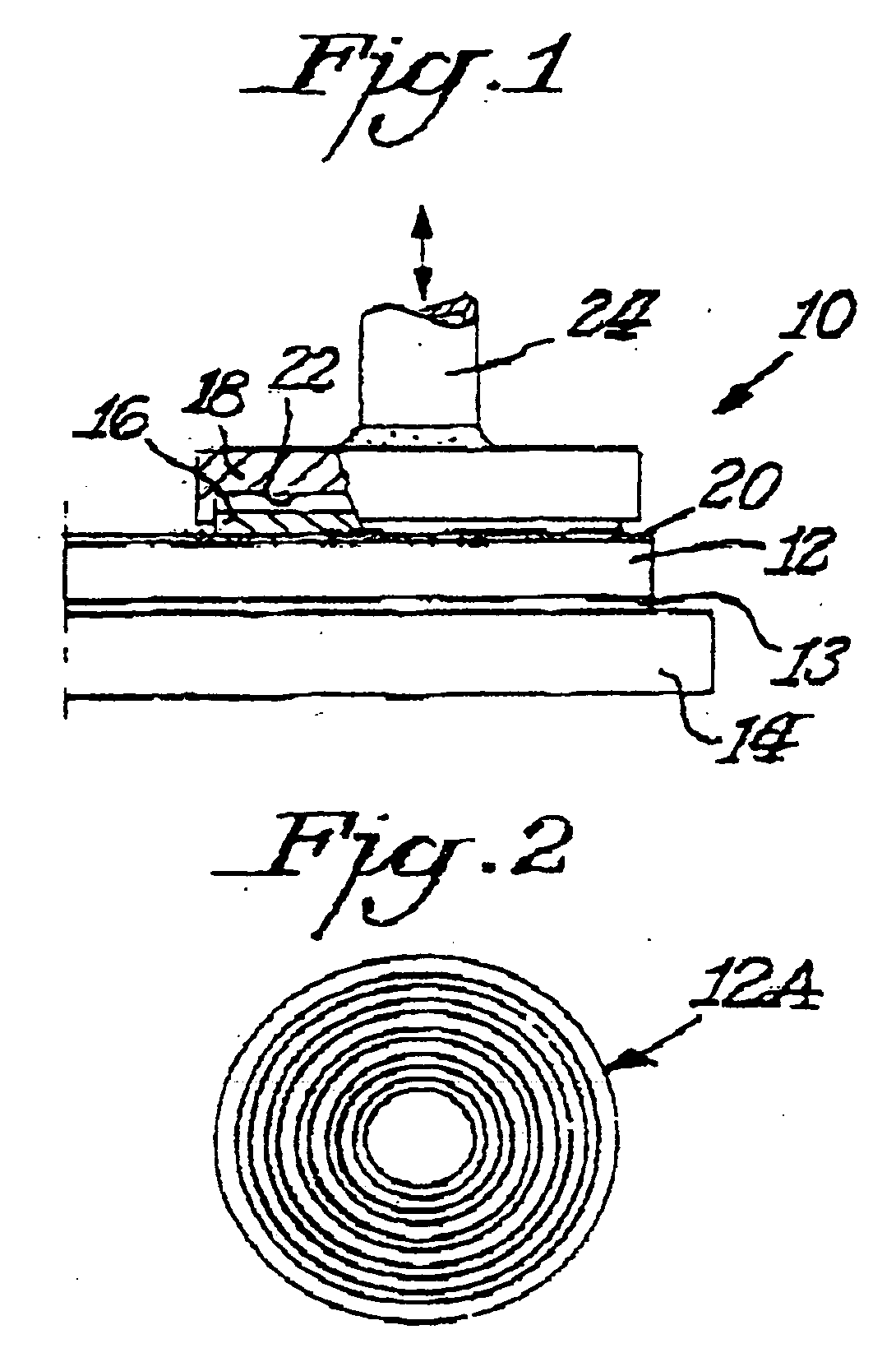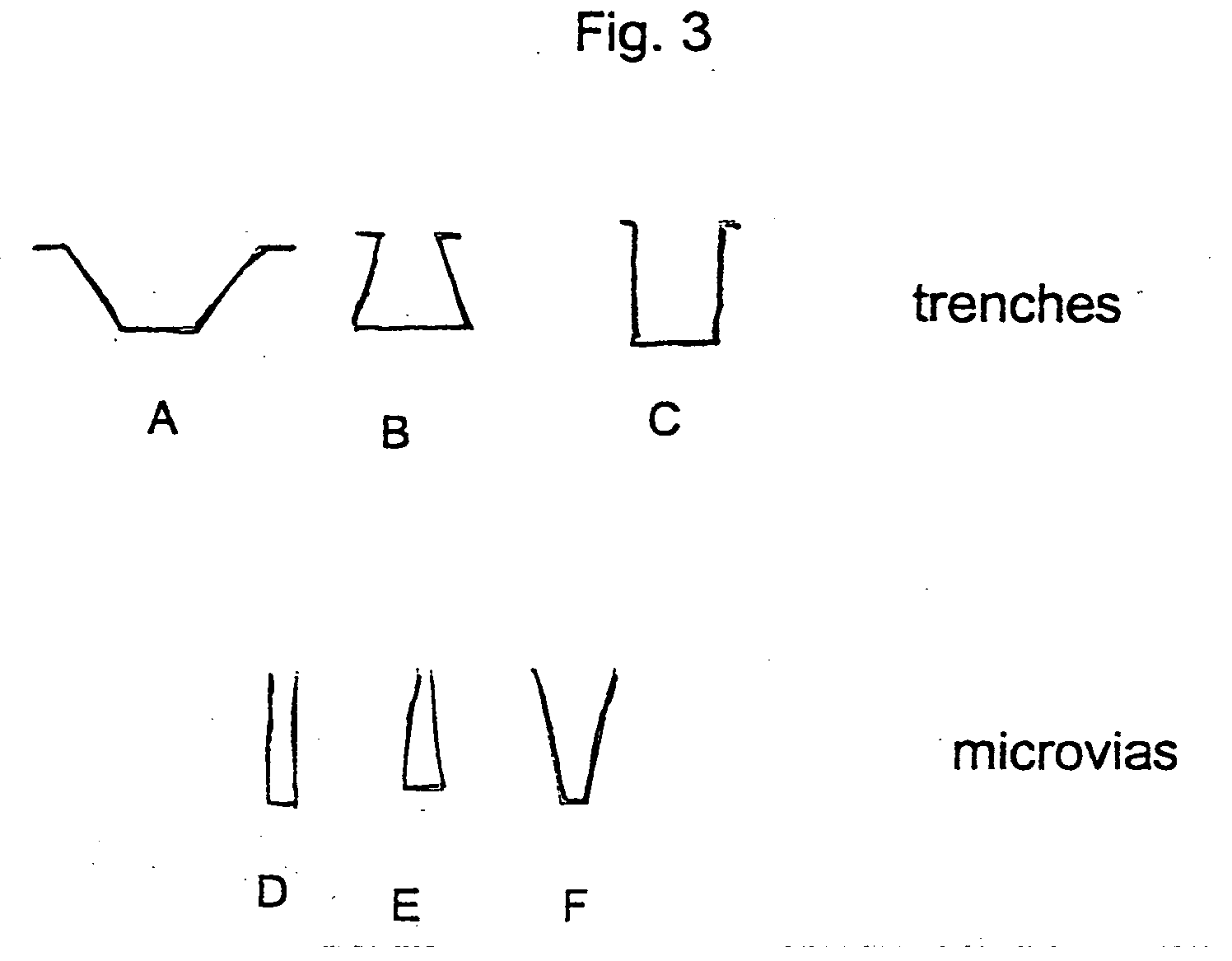Electrolytic copper plating solutions
a technology of electrolysis and copper plating, applied in the field of electrolysis copper plating solutions, can solve problems such as counterintuitive to conventional though
- Summary
- Abstract
- Description
- Claims
- Application Information
AI Technical Summary
Benefits of technology
Problems solved by technology
Method used
Image
Examples
example 1
[0060] A preferred copper electroplating bath of the invention was prepared by admixing the following components in water. In the composition the brightener was bis-sodium-sulfonopropyl-disulfide and the suppressor was a polyethylene glycol polymer sold under the tradename PEG 8000 by Union Carbide.
ComponentConcentrationCuSO4 5H2O 60 g / lH2SO4225 g / lCl 50 ppmSuppressor 1 g / lBrightener 2.1 mg / l
[0061] Through hole walls of a printed circuit board substrate and microvias were plated as follows with the above plating composition. An air-agitated plating tank outfitted with multiple cathode rails and one rectifier was charged with the above copper plating solution. During plating, the following deposition conditions were employed: current density of 14.5 mA / cm2; waveform was DC; temperature plating bath was 25° C. After termination of the plating procedure, a microvia of the board substrate was examined It was found that copper completely filled the microvia walls to provide a smooth un...
example 2
[0062] A further preferred copper electroplating bath of the invention was prepared by admixing the following components in water. In the composition the brightener was bis-sodium-sulfonopropyl-disulfide and the suppressor was a propylene glycol copolymer sold under the tradename L62D by BASF.
ComponentConcentrationCuSO4 5H2O 70 g / lH2SO4 175 g / lCl 50 ppmSuppressor0.875 g / lBrightener 2.4 mg / l
[0063] 200 nm with 7:1 aspect ratio microvias of a back end of the line semiconductor microchip wafer were plated using the above plating composition. The wafer was electrically attached to a cathode and the plating solution was pumped onto the surface of the wafer while rotating at upwards of 200 RPM. Electrical current of 14.5 mA / cm2 was applied with DC wave form at 25° C. After termination of the plating procedure, the microvias were filled with no defects as determined by focused ion beam examination.
example 3
[0064] A further preferred copper electroplating bath of the invention was prepared by admixing the following components in water. In the composition the brightener was bis-sodium-sulfonopropyl-disulfide and the suppressor was a propylene glycol copolymer sold under the tradename L62D by BASF.
ComponentConcentrationCuSO4 5H2O 60 g / lH2SO4 225 g / lCl 50 ppmSuppressor 1 g / lBrightener0.35 mg / l
[0065] 200 nm with 4:1 aspect ratio microvias of a semiconductor microchip wafer were plated using the above comparative plating composition under conditions as described in Example 2. After termination of the plating procedure, the microvias were examined by scanning electron microscopy (SEM) and focused ion beam examination. Those examinations showed the copper deposits in the microvias contained defects of voids, seams and inclusions.
PUM
| Property | Measurement | Unit |
|---|---|---|
| Mass | aaaaa | aaaaa |
| Mass | aaaaa | aaaaa |
| Diameter | aaaaa | aaaaa |
Abstract
Description
Claims
Application Information
 Login to View More
Login to View More - R&D
- Intellectual Property
- Life Sciences
- Materials
- Tech Scout
- Unparalleled Data Quality
- Higher Quality Content
- 60% Fewer Hallucinations
Browse by: Latest US Patents, China's latest patents, Technical Efficacy Thesaurus, Application Domain, Technology Topic, Popular Technical Reports.
© 2025 PatSnap. All rights reserved.Legal|Privacy policy|Modern Slavery Act Transparency Statement|Sitemap|About US| Contact US: help@patsnap.com


